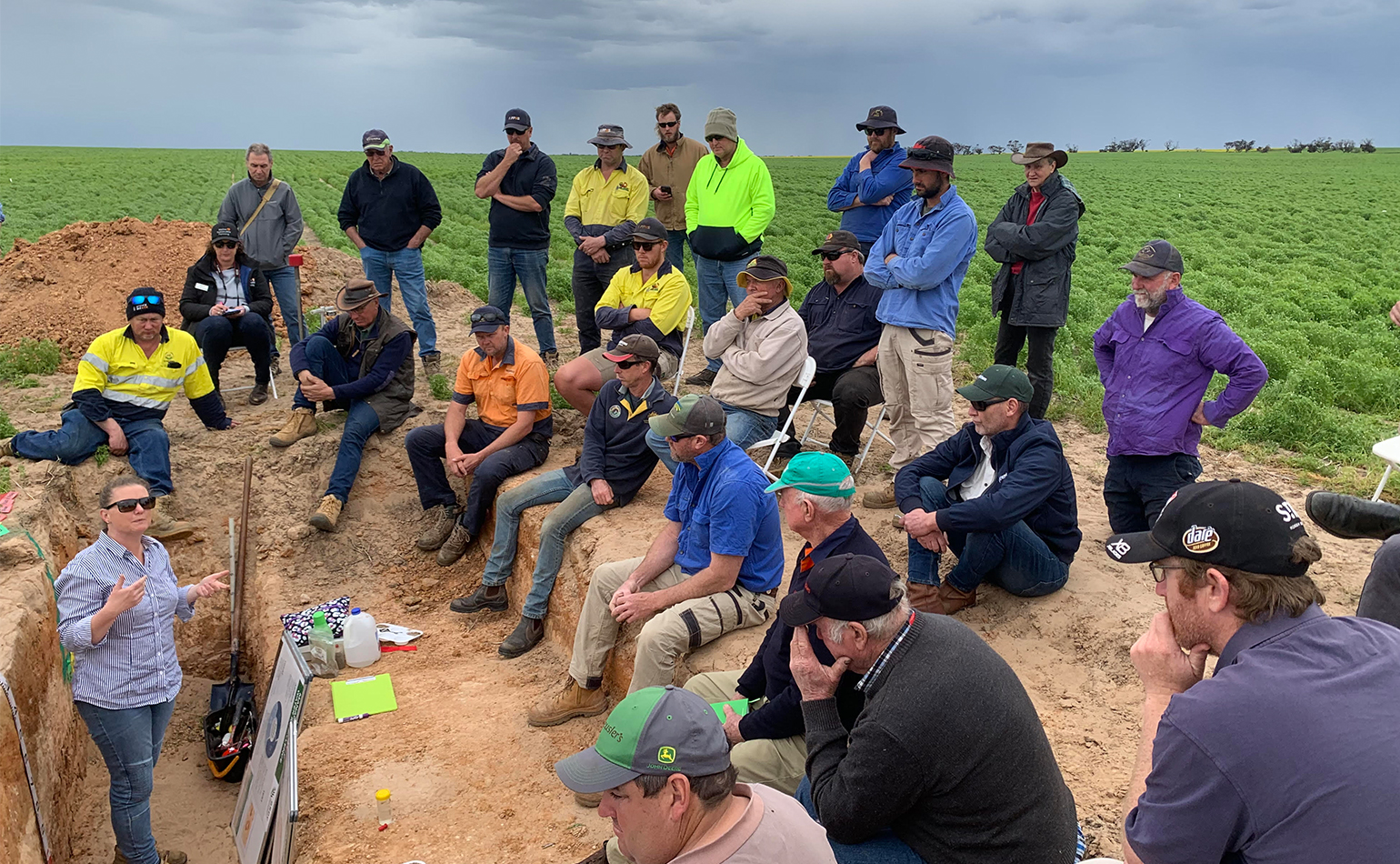Dr Melissa Fraser talks about the major subsoil constraints in the Pinnaroo district in South Australia. Photo Jay Cummins.
Soil scientist Alisa Bryce sat down with Jay Cummins, Program Manager for Mallee Sustainable Farming, for a five minute chat.
Tell us about Mallee Sustainable Farming (MSF)
25 years ago, MSF formed largely through the need to conduct local, on-farm research for farmers in low rainfall environments.
MSF is a not-for-profit, farmer-led organisation that is administered by a board of six farmer directors and two specialist directors. Our most important asset is our farmer members, and with over 1,500 members across three states it’s a big task to identify their RD&E needs and ensure this work is carried out across the region.
What area and type of farming do you cover?
The MSF covers around four million hectares of low rainfall (< 350mm) cropping zones across the Mallee areas of South Australia, north west Victoria and into far western NSW. Our focus is on dryland farming systems, with the majority of farmers in this region being family run businesses. Farming activities include cropping (wheat, barley, vetch, lupins and canola) and livestock (sheep for wool, lambs and cattle for meat).
What type of soil do you have?
The soils across our region vary considerably, ranging from shallow limestone sandy loams to deep sands, and of course the mallee dune-swale systems. Low fertility, low soil organic carbon levels and non-wetting sands are common across the region. Subsoil constraints are also a challenge, including high soil boron levels, alkaline pH, compaction, mallee seeps, salinity and more. You name it, we’ve got it!
Why is soil important to your members?
Soil underpins the whole production system. The mallee environment is characterised by extremely low rainfall, with the growing season rainfall generally being 200 mm or less across the region. In years of extremely low rainfall (say 75-100 mm) many farmers have still been able to grow economically viable crops, which is an amazing feat! This has only been possible through the adoption of no-till, crop rotations incorporating legume grains or pastures, making informed decisions according to available soil moisture in the profile at seeding as well as good old fashioned risk management and sound agronomic practices.
There are still a lot of unanswered questions about soil management in our region. Some farmers are seeing benefits from occasional mechanical soil amelioration practices including deep ripping and delving, but there is much more research that needs to happen on-farm. For example, identifying how long the benefits of soil amelioration last and quantifying soil carbon sequestration benefits.
Tell me about the ways in which you communicate with your farmer members?
Because we cover such a large area, and farmers are very busy people, we wanted a way to take trial results to our farmers, so we recently introduced the Immersive Ag Platform. Immersive Ag is a bit like Google Street View, allowing farmers to view field days and trials online. The platform has 360-degree vision so farmers can ‘walk through’ and compare trial plots. Drone footage, observations and results are updated throughout the season. This system was very useful during the travel restrictions with COVID.
Why did MSF become a participant in the Soil CRC?
MSF recognises the benefits of being part of a national network that is actively addressing on-farm constraints to production through developing a better understanding of soil dynamics. We also have a range of regionally specific soil issues that limit production – we hope to answer these through Soil CRC projects.
What is exciting about working with the Soil CRC?
Until recently, our small team meant we had a limited capacity to be part of Soil CRC activities. MSF have grown considerably in the past 12 months, and we are now in a far better position to engage with the Soil CRC. We are very keen to be part of some new and exciting projects.
Our focus on applied research and extension aligns nicely with the Soil CRC’s emphasis on extension, outreach and farmer adoption.

